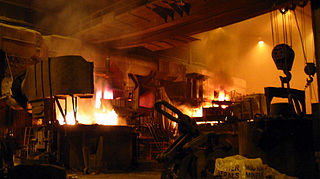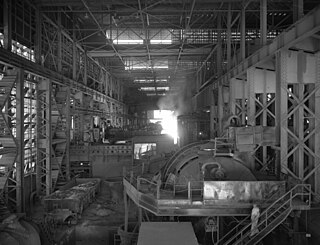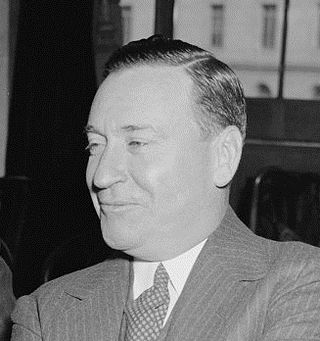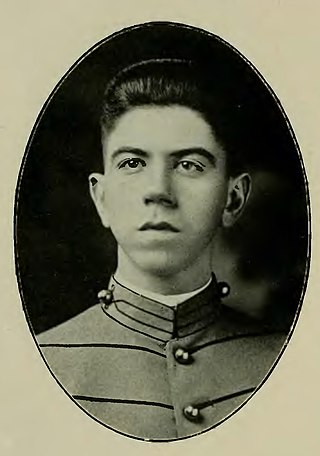Related Research Articles

Steelmaking is the process of producing steel from iron ore and/or scrap. In steelmaking, impurities such as nitrogen, silicon, phosphorus, sulfur and excess carbon are removed from the sourced iron, and alloying elements such as manganese, nickel, chromium, carbon and vanadium are added to produce different grades of steel.

The Bethlehem Steel Corporation was an American steelmaking company headquartered in Bethlehem, Pennsylvania. Until its closure in 2003 it was one of the world's largest steel producing and shipbuilding companies. At the height of its success and productivity, the company was a symbol of American manufacturing leadership in the world, and its decline and ultimate liquidation in the late 20th century is similarly cited as an example of America's diminished manufacturing leadership. From its founding in 1857 through its 2003 dissolution, Bethlehem Steel's headquarters and primary steel mill manufacturing facilities were based in Bethlehem, Pennsylvania, in the Lehigh Valley region of the United States.

United States Steel Corporation, more commonly known as U.S. Steel, is an American integrated steel producer headquartered in Pittsburgh, Pennsylvania, with production operations primarily in the United States of America and in Central Europe. The company produces and sells steel products, including flat-rolled and tubular products for customers in industries across automotive, construction, consumer, electrical, industrial equipment, distribution, and energy. Operations also include iron ore and coke production facilities.

Philip Murray was a Scottish-born steelworker and an American labor leader. He was the first president of the Steel Workers Organizing Committee (SWOC), the first president of the United Steelworkers of America (USWA), and the longest-serving president of the Congress of Industrial Organizations (CIO).

A steel mill or steelworks is an industrial plant for the manufacture of steel. It may be an integrated steel works carrying out all steps of steelmaking from smelting iron ore to rolled product, but may also be a plant where steel semi-finished casting products are made from molten pig iron or from scrap.

Lee Pressman was a labor attorney and earlier a US government functionary, publicly alleged in 1948 to have been a spy for Soviet intelligence during the mid-1930s, following his recent departure from Congress of Industrial Organizations (CIO) as a result of its purge of Communist Party members and fellow travelers. From 1936 to 1948, he represented the CIO and member unions in landmark collective bargaining deals with major corporations including General Motors and U.S. Steel. According to journalist Murray Kempton, anti-communists referred to him as "Comrade Big."
Wheeling-Pittsburgh Steel was a steel manufacturer based in Wheeling, West Virginia.
Kaiser Aluminum Corporation is an American aluminum producer. It is a spinoff from Kaiser Aluminum and Chemicals Corporation, which came to be when common stock was offered in Permanente Metals Corporation and Permanente Metals Corporation's name was changed to Kaiser Aluminum and Chemicals Corporation.

The Youngstown Sheet and Tube Company, based in Youngstown, Ohio, was an American steel manufacturer. Officially, the company was created on November 23, 1900, when Articles of Incorporation of the Youngstown Iron Sheet and Tube Company were filed with the Ohio Secretary of State at Columbus. In 1905 the word "Iron" was dropped from the company name to reflect the company's shift in focus from producing wrought iron products to basic steel products. It acquired the Mark Manufacturing Company in 1923. Youngstown Sheet and Tube remained in business until 1977. A Youngstown resident acquired the name, trademark, and logo in 2014 and opened a small business promoting the economic redevelopment of Youngstown.
The Steel Workers Organizing Committee (SWOC) was one of two precursor labor organizations to the United Steelworkers. It was formed by the CIO on June 7, 1936. It disbanded in 1942 to become the United Steel Workers of America. The Steel Labor was the official paper of SWOC.

Amalgamated Association of Iron and Steel Workers (AA) was an American labor union formed in 1876 to represent iron and steel workers. It partnered with the Steel Workers Organizing Committee of the CIO, in November 1935. Both organizations disbanded May 22, 1942, to form a new organization, the United Steelworkers.

The United Steel Companies was a steelmaking, engineering, coal mining and coal by-product group based in South Yorkshire and Lincolnshire, England.

Benjamin Franklin Fairless was an American steel company executive. He was president of a wide range of steel companies during a turbulent and formative period in the American steel industry. His roles included President of Central Alloy Steel from 1928 to 1930; First Vice President of Republic Steel from 1930 to 1935; President of the Carnegie-Illinois Steel Company from 1935 to 1938; and then President (1938–1955), and later Chief Executive Officer and Chairman of the board of directors (1952–1955) of U.S. Steel, the largest steel corporation in the United States.

Charles McElroy White was an American steel manufacturing executive. He was a protégé of Tom M. Girdler, and was briefly superintendent of Jones and Laughlin Steel Company in 1929. He followed Girdler to the rapidly growing Republic Steel in 1930, where he was appointed president of the company in 1945. He was promoted to chairman of the board of directors and chief executive officer in 1956. He retired in 1960.

The Little Steel strike was a 1937 labor strike by the Congress of Industrial Organizations (CIO) and its branch the Steel Workers Organizing Committee (SWOC), against a number of smaller steel producing companies, principally Republic Steel, Inland Steel, and Youngstown Sheet and Tube Company. The strike affected a total of thirty different mills belonging to the three companies, which employed 80,000 workers. The strike, which was one of the most violent labor disputes of the 1930s, ended without the strikers achieving their principal goal, recognition by the companies of the union as the bargaining agent for the workers.

The Congress of Industrial Organizations (CIO) was a federation of unions that organized workers in industrial unions in the United States and Canada from 1935 to 1955. Originally created in 1935 as a committee within the American Federation of Labor (AFL) by John L. Lewis, a leader of the United Mine Workers (UMW), and called the Committee for Industrial Organization. Its name was changed in 1938 when it broke away from the AFL. It focused on organizing unskilled workers, who had been ignored by most of the AFL unions.
Stanley H. Ruttenberg was an American labor economist, CIO union organizer, director of the research department of the AFL–CIO, and assistant secretary of Labor under U.S. President Lyndon Baines Johnson.
Meyer Bernstein (1914–1985) was a 20th-Century American labor leader and educator who worked for the Steel Workers Organizing Committee (SWOC), the United Steel Workers of America (USWA), the U.S. Department of Labor, and the United Mine Workers of America (UMW).
Harold J. Ruttenberg was an American labor activist for the Congress of Industrial Organizations's Steel Workers Organizing Committee (SWOC) and later United Steel Workers of America (USWA), who in 1946 left labor for management and became an "outspoken" business executive in the steel industry.
References
- ↑ "Portsmouth Steel Company (Local History Digital Collection)". Portsmouth Public Library. Retrieved 20 February 2020.
- 1 2 3 "New Boston Coke". Abandoned Online. 28 June 2019. Retrieved 20 February 2020.
- ↑ "Absorbs Affiliated Concern". Steel and Iron. American Manufacuturer. 49: 248. 22 February 1915. Retrieved 20 February 2020.
- ↑ Gall, Gilbert J. (1999). Pursuing Justice: Lee Pressman, the New Deal, and the CIO. SUNY Press. p. 56. ISBN 9780791441039 . Retrieved 31 July 2017.
- ↑ "Ruttenberg". Kiplinger's Personal Finance. American Manufacuturer: 14. April 1947. Retrieved 20 February 2020.
- ↑ Clark, Paul F.; Gottlieb, Peter; Kennedy, Donald (2018). Forging a Union of Steel: Philip Murray, SWOC, and the United Steelworkers. Cornell University Press. p. 124. ISBN 9781501721137 . Retrieved 20 February 2020.
- ↑ Cloke, H. Walton (27 May 1948). "Steel Man Levels 'Vilification' Cry: Portsmouth Phone Calls Data Given by SEC 'Misinformer' in Kaiser Case, He Avers: Stirs Uproar in Hearing". New York Times. p. 37. Retrieved 18 March 2017.
- ↑ Cloke, H. Walton (27 May 1948). "Pressman Denies Kaiser Suit Link: Contradicts Testimony of SEC Aide That He Was Consulted as to Lawyer for Action". New York Times. p. 37. Retrieved 18 March 2017.
- ↑ "Small Steel Starts to Sign Up". BusinessWeek. October 1949. p. 94. Retrieved 20 February 2020.